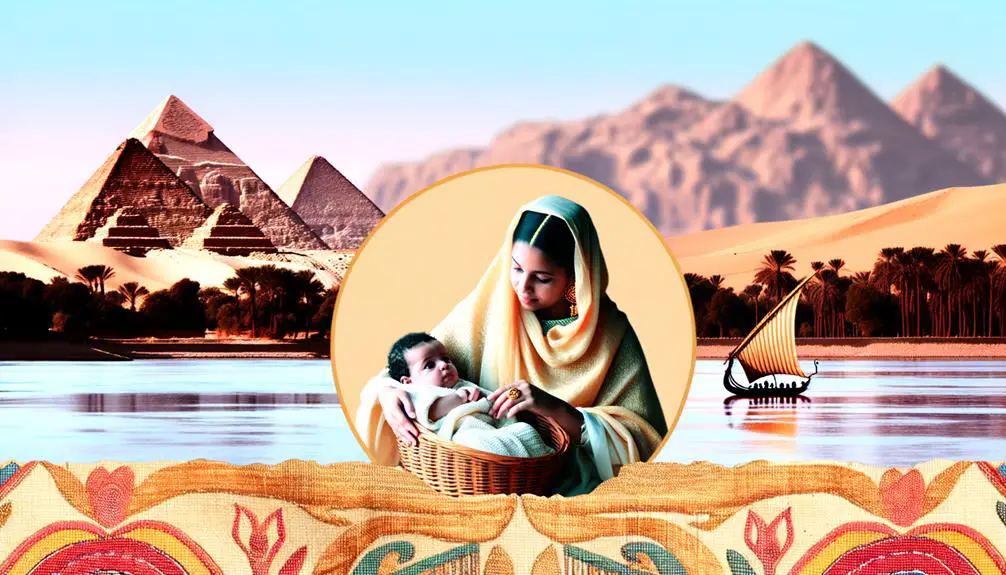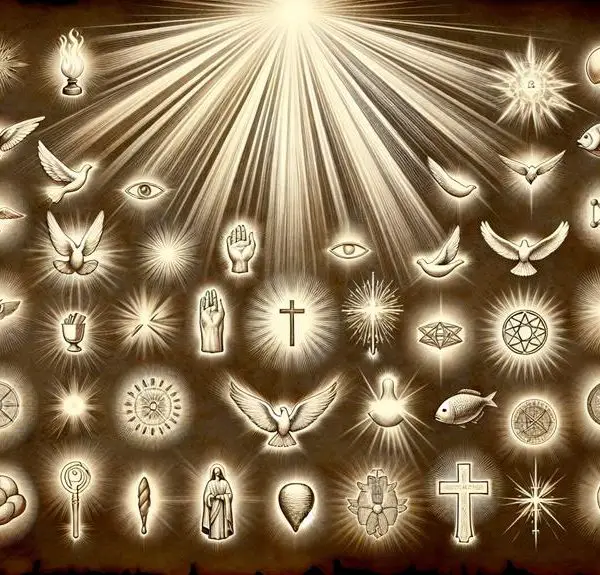Hidden in the pages of the Bible, the name of Moses' mother holds a story of faith and courage, waiting to be discovered.

The Name of Moses Mother in the Bible
Isn't it interesting how names carry so much weight, yet we often overlook the stories behind them?
You might find it intriguing that Moses' mother, a figure of immense faith and courage, is not as frequently discussed as her son. Her name, Jochebed, holds a rich tapestry of meaning and legacy within the biblical narrative.
As you ponder her life's impact, you're drawn into a deeper understanding of not just her story, but the profound influence she had on Moses and the course of history. This beckons you to explore further, uncovering layers of resilience and faith that resonate even today.
Key Takeaways
- Moses' mother is named Jochebed in the biblical narratives.
- Jochebed's actions, including hiding Moses in a basket, symbolize faith and resistance.
- Her influence profoundly shaped Moses' identity and spiritual leadership.
- Jochebed's name signifies her deep devotion, resilience, and role in deliverance.
Unveiling Moses' Mother

Moses' mother, Jochebed, plays a pivotal role in biblical narratives, embodying resilience and faith amidst adversity. Central to her story is an intricate web of family secrecy and maternal anonymity, aspects that shape the early chapters of Moses' life profoundly. You'll find that the Bible, while rich in its depiction of Moses' exploits, maintains a conspicuous silence on Jochebed for significant stretches, a narrative choice that invites a closer examination.
Family secrecy isn't just a matter of narrative intrigue; it reflects the socio-political pressures of the time. Jochebed's actions, shrouded in secrecy, are a direct response to the pharaoh's decree against Hebrew male infants. This context underscores her bravery but also necessitates a cloak of anonymity around her maternal role. It's a protective mechanism, ensuring the survival of her son, but it also casts a shadow over her identity, relegating her to the margins of the story.
Maternal anonymity in Jochebed's narrative isn't merely a byproduct of her circumstances but a potent statement on the visibility of women in ancient texts. While her name is eventually revealed, the delayed disclosure speaks volumes about the valuation of women's stories and contributions. This anonymity, coupled with the critical role she plays, invites a reevaluation of maternal figures in biblical stories, urging a recognition of their resilience and agency.
In dissecting the layers of family secrecy and maternal anonymity, you uncover not just the nuances of Jochebed's character but also broader themes of visibility, agency, and resistance in biblical narratives, offering a richer understanding of these ancient texts.
The Biblical Account

You'll find the biblical account provides a rich narrative context for understanding Moses' mother. Her identification, coupled with her courageous act, are pivotal to grasping her legacy and significance within the scriptural texts.
This analysis not only illuminates her role but also enriches our comprehension of the broader historical and theological implications.
Moses' Mother Identified
In the biblical narrative, Jochebed is identified as the mother of Moses, playing a pivotal role in his early life and preservation. The narrative is steeped in family secrecy and maternal anonymity, highlighting the socio-political complexities of the time.
Aspect |
Detail |
|---|---|
Name |
Jochebed |
Relation |
Mother of Moses |
Significance |
Protector and early influencer |
This table encapsulates the essence of Jochebed's role within the biblical account, underscoring her pivotal position while navigating the intricacies of her environment. Her story is emblematic of resilience and strategic maneuvering amidst adversity, offering a nuanced understanding of maternal figures in ancient texts. Her identity, though veiled by anonymity and secrecy, emerges as central to the narrative's development.
Her Courageous Act
Jochebed's act of placing her son in a basket on the Nile River embodies a profound courage, strategically challenging the oppressive edicts of her time. This river's decision wasn't made lightly; it was a calculated risk, underpinned by a deep faith and a mother's desperate hope for her child's survival.
Basket weaving, traditionally a mundane task, was transformed into an act of silent resistance. Through her hands, a simple reed basket became a vessel of salvation, not just for her son, but symbolically for an entire people. Jochebed's choice reflects an intricate understanding of her sociopolitical context, leveraging the river's currents both literally and metaphorically to carve a path toward deliverance.
This act isn't just bravery; it's a profound assertion of faith and defiance.
Legacy and Significance
The legacy of Moses' mother, Jochebed, extends beyond her immediate act of courage, embodying a profound significance within the biblical narrative. Her story illuminates the power of maternal instincts and the preservation of cultural traditions in the face of adversity. Consider these aspects:
- Jochebed's decision to save Moses underscores the strength of maternal instincts.
- Her actions highlight the importance of cultural traditions in maintaining identity.
- Jochebed's faith showcases trust in divine providence.
- Her ingenuity in protecting her son reflects wisdom and foresight.
- The legacy of Jochebed serves as a testament to the impact of individual courage on the course of history.
Analyzing Jochebed's life reveals the intricate blend of personal bravery and adherence to cultural values within the biblical account.
The Significance of Her Name

You'll find that the name of Moses' mother carries a deep symbolic meaning, reflecting not only her personal identity but also her pivotal role in the biblical narrative. Its analysis, grounded in historical context, reveals the impact of her name on the unfolding events and her son's destiny.
This examination underscores the intricate relationship between nomenclature and divine providence in biblical stories.
Name's Symbolic Meaning
Often, names in the Bible carry deep symbolic meanings, reflecting the destiny or traits of the person bearing them, and Moses' mother's name, Jochebed, is no exception. Delving into the name origins and cultural interpretations, Jochebed's name is rich with significance:
- Glory to God: Her name suggests a devotion to the divine.
- Forebearer of Deliverance: Reflects her role in Moses' early salvation.
- Strength and Resilience: Echoes the qualities necessary to protect her son.
- Connection to Heritage: Implies a deep bond with her ancestral roots.
- Bearer of the Future: Symbolizes her part in the unfolding of Israelite history.
Analyzing Jochebed's name reveals layers of meaning, underscoring her pivotal role in biblical narratives through symbolic resonance.
Historical Context Impact
Exploring the historical context, Jochebed's name gains deeper significance, reflecting the socio-political and religious turmoil of her era. Her name, embedded in ancient customs, serves as a testament to the resilience and faith of a people amidst oppression. It's crucial to understand how societal norms of the time influenced the naming conventions, revealing much about the cultural and spiritual landscape.
Aspect |
Significance |
|---|---|
Ancient Customs |
Reflected in the choice of names, conveying beliefs and values. |
Societal Norms |
Names encapsulated societal expectations and roles. |
Spiritual Beliefs |
Names often invoked divine protection or blessings. |
Cultural Identity |
Preserved heritage and connected generations. |
Resistance |
Names could symbolize defiance against oppressors. |
Jochebed's name, therefore, isn't just a label but a narrative, woven into the fabric of her people's history, embodying their struggles and hopes.
A Mother's Courage

In analyzing the biblical account, it becomes evident that Moses' mother, Jochebed, exhibited unparalleled courage when she placed her infant son in a basket on the Nile River to save him from certain death. This act wasn't merely a desperate attempt at survival; it was a profound demonstration of parental sacrifice and risky faith. Jochebed's decision underscores a pivotal moment where faith intersects with action, revealing the depth of a mother's love and the lengths to which she'll go to protect her child.
The weaving of the papyrus basket, waterproofed with tar and pitch, symbolizes meticulous preparation and hope amidst despair.
The placing of Moses among the reeds along the Nile's bank represents a strategic choice for safety and discovery.
The watchful eye of Moses' sister, Miriam, illustrates a family's collective courage and unity in the face of danger.
The eventual discovery of Moses by Pharaoh's daughter highlights the unpredictability of faith's outcome, yet the fulfillment of divine providence.
The agreement for Jochebed to nurse and care for her own son, under the protection of Pharaoh's household, encapsulates the irony and victory of faith over fear.
Jochebed's story is a timeless testament to the power of a mother's love, fortified by faith in the face of immense danger. Her actions not only saved her son but set into motion events that would forever alter the course of history. Through Jochebed's example, we gain insight into the essence of parental sacrifice and the profound impact of risky faith.
The Legacy Left Behind

Jochebed's courageous actions not only ensured Moses' survival but also laid the foundation for a legacy that would shape the destiny of a nation. Her story, deeply embedded in the fabric of Jewish history, exemplifies the profound impact of maternal sacrifices on both individual and collective futures. The narrative of Jochebed, by preserving Moses' life, contributed significantly to the cultural influences that have defined and guided the Jewish people through centuries.
Analyzing this legacy, one must consider the multifaceted aspects of Jochebed's influence. Her decision to save her son, in defiance of the Pharaoh's decree, highlights a fearless commitment to her offspring and her faith. This act of bravery not only secured Moses' place in history but also served as a testament to the power of maternal love and determination. It's a narrative that has inspired countless generations, reinforcing the values of courage and faith in the face of adversity.
Moreover, Jochebed's legacy transcends the immediate act of saving her son. It encompasses the cultural preservation of Jewish identity through maternal lineage. Her actions underscore the importance of cultural influences in shaping the social and religious fabric of the Jewish people. This narrative has become a cornerstone in Jewish lore, emphasizing the role of women and mothers in the perpetuation of faith and cultural values.
Her Influence on Moses

The profound influence of Jochebed on Moses is evident through his leadership, moral fortitude, and deep faith, traits that were undoubtedly shaped by his mother's example and teachings. This influence is a testament to the critical role of parental guidance and early education in shaping the characters and destinies of leaders.
Jochebed's impact on Moses can be visualized through several key facets:
- The Courage of Conviction: Jochebed's decision to save Moses instilled in him the courage to stand up for what's right, even against overwhelming odds.
- The Value of Identity: By ensuring Moses knew his heritage, Jochebed fostered a strong sense of identity within him, crucial for his future role as a leader of the Hebrews.
- The Importance of Compassion: Moses' actions, from intervening in the mistreatment of Hebrews to his leadership during the Exodus, reflect the compassion likely nurtured by Jochebed.
- The Power of Faith: Jochebed's unwavering faith in the face of danger laid the foundation for Moses' deep spiritual leadership.
- The Principle of Justice: Her early teachings likely influenced Moses' sense of justice, seen in his laws and judgments.
Analytically dissecting the narrative, it becomes clear that Jochebed's early education and parental guidance were instrumental in molding Moses into the leader he became. Her influence extends beyond mere survival; it encompasses the moral and spiritual education that equipped Moses to fulfill his destiny. This underscores the significance of parental influence in the early formative years, highlighting how foundational lessons can shape the course of history.
Reflections on Faith and Resilience

Reflecting on Jochebed's story, we observe how her unwavering faith and resilience underpin the narrative, shaping pivotal moments in biblical history.
You see, Jochebed's actions demonstrate not just a mother's love but a profound level of parental sacrifice and spiritual resilience. In a time of despair, when her newborn's life was threatened by a decree, her faith didn't waver. Instead, she crafted a waterproof basket and placed her son, Moses, among the reeds of the Nile River, entrusting his fate to a higher power. This act of faith, risking everything for the chance of a better future for her child, exemplifies parental sacrifice at its core.
Moreover, Jochebed's spiritual resilience is highlighted when she's reunited with Moses, brought on to nurse him by a twist of divine fate. This reunion isn't just a testament to her faith's strength but also serves as a foundational period where Moses would be imbued with the values and beliefs of his people, despite growing up in an Egyptian palace. Here, you're reminded that spiritual resilience can profoundly impact not just the individual but the generations that follow.
In analyzing Jochebed's story, it's clear that her resilience and faith weren't passive traits but active forces that drove her to make unimaginable sacrifices. These actions, rooted in deep spiritual conviction, underscore the narrative's broader themes of faith's power to overcome adversity. Through her story, you're invited to reflect on the significance of parental sacrifice and spiritual resilience, recognizing their enduring relevance in shaping history and personal destinies.
Frequently Asked Questions
How Does Moses' Mother's Story Compare With Other Maternal Figures in Religious Texts Outside of the Bible?
When you explore Moses' mother's story, you'll find themes of motherly sacrifice and cultural symbolisms that resonate across various religious texts. Unlike some maternal figures who embody nurturing aspects, she's a beacon of courage, making tough choices for her child's safety. Analyzing her narrative reveals parallels and contrasts with other mothers in religious lore, highlighting the universal depiction of maternal strength, yet imbued with unique cultural and theological nuances specific to each tradition.
Are There Any Archaeological Findings or Historical Records That Corroborate the Existence of Moses' Mother?
If you're digging for evidence on Moses' mother, you'll find that excavation techniques and manuscript analysis haven't yet unearthed definitive proof of her existence.
While archaeologists and scholars tirelessly sift through ancient texts and relics, the puzzle remains incomplete. This meticulous journey, blending science with history, keeps the intrigue alive.
Yet, in the absence of concrete evidence, her story, like many from antiquity, hovers between historical speculation and revered tradition.
How Has Moses' Mother Been Portrayed in Different Artistic Mediums Throughout History, Such as in Paintings, Sculptures, or Films?
You'll find that Moses' mother has been depicted through diverse artistic lenses, each embodying a unique blend of artistic symbolism and cultural representation.
Whether it's the tender strokes of a Renaissance painting, the bold forms of a sculpture, or the dramatic scenes in a film, these portrayals offer deep insights into her character.
They reflect not just the era's artistic styles but also the societal values and religious sentiments of the time.
What Are the Psychological Interpretations of Moses' Mother's Actions and Decisions According to Modern Psychology?
Necessity is the mother of invention, and in analyzing Moses' mother's actions, modern psychology offers intriguing insights. Through the lens of attachment theory, her decision to place Moses in the Nile reflects profound maternal instinct and resilience.
This act, driven by a dire situation, showcases her adaptability and decision-making resilience. Such analysis reveals the psychological complexity behind her choices, illustrating a deep, instinctual drive to protect her child at all costs.
How Do Various Jewish, Christian, and Islamic Traditions Differently Understand and Honor Moses' Mother?
In exploring how Jewish, Christian, and Islamic traditions each uniquely understand and honor Moses' mother, you'll find differences in naming traditions and religious ceremonies.
Jewish narratives often emphasize her bravery, celebrated through Passover stories. Christians might highlight her faith, incorporated into sermons or educational materials. Meanwhile, Islamic texts laud her trust in God, with her story woven into Quranic interpretations.
Each tradition, through its lens, offers a distinct perspective on her legacy.
Conclusion
In the grand tapestry of biblical history, Moses' mother, Jochebed, emerges not merely as a figure of maternal instinct but as a colossus of faith and resilience. Her decision to defy a pharaoh's decree catapulted her into the annals of spiritual legends, her name synonymous with unparalleled courage.
Jochebed's influence on Moses wasn't just formative; it was revolutionary, shaping the destiny of a nation. Her legacy, a testament to the power of faith, continues to inspire, illustrating that sometimes, a mother's love can indeed alter the course of history.



Sign up